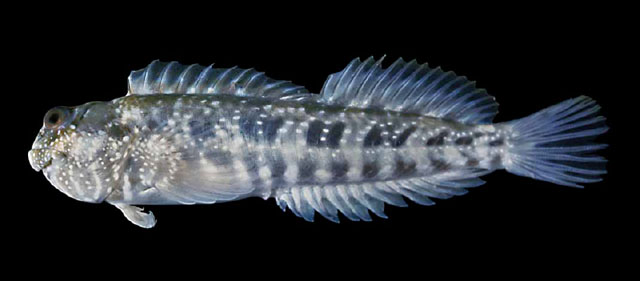| Blenniidae (Combtooth blennies), subfamily: Salariinae |
| 4.25 cm SL (male/unsexed) |
|
demersal; marine; depth range 0 - 1 m |
| Indian Ocean: Gulf Of Aqaba, Egypt. |
|
Dorsal spines (total): 13; Dorsal soft rays (total): 15-15; Anal spines: 2; Anal soft rays: 15-17; Vertebrae: 34. Ventral margin of upper lip smooth medially, crenulae present on lateral thirds; nape with simple or multifid cirri on each side; supraorbital tentacle branched; preopercular pore positions with simple pores; 3 (rarely 4) predorsal commissural pores; lips, head and body with small white spots; no contrasting dark humeral spot; oblique dark bar behind eye (Ref. 84157). |
| The only known specimens are from a single collection from Ras Mohammed at the southern end of the Gulf of Aqaba. They were collected from a rocky shore at the north end of a mangrove channel from a depth of 0.2 m (Ref. 84157). According to traits of the family where this species belongs, adult individuals are oviparous. Eggs are demersal and adhesive (Ref. 205), and are attached to the substrate via a filamentous, adhesive pad or pedestal (Ref. 94114). Larvae are planktonic, often found in shallow, coastal waters (Ref. 94114). |
|
Endangered (EN); Date assessed: 13 May 2010 (B1ab(iii)+2ab(iii)) Ref. (130435)
|
| harmless |
Source and more info: www.fishbase.org. For personal, classroom, and other internal use only. Not for publication.
